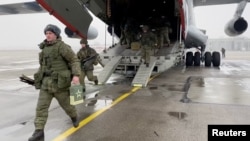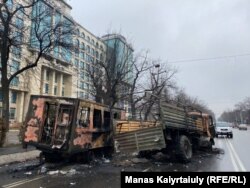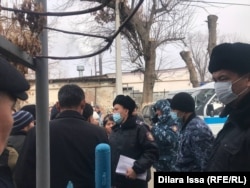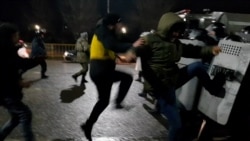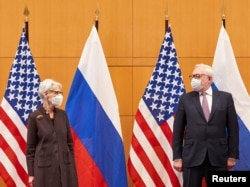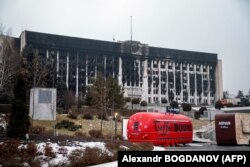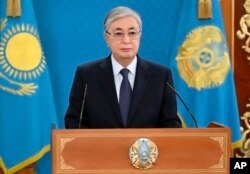Russia could use the deployment of Collective Security Treaty Organization peacekeeping troops to Kazakhstan, the military alliance's first to a member-state, to fight alleged "terrorism" as part of its campaign against both NATO expansion eastwards and ongoing U.S. and E.U. sanctions, some Russian analysts believe. The tactic, however, carries risks for Russia.
Russian President Vladimir Putin on January 10 described the peacekeeping mission as a demonstration that the six-member defensive bloc will not tolerate instability “at home” or “color revolutions,” Moscow’s euphemism for protesters overthrowing elected governments at the alleged instigation of Western actors.
Russia began dispatching the bulk of some 2,300 Collective Security Treaty Organization (CSTO) troops within hours of Kazakh President Qasym-Zhomart Toqaev’s January 6 appeal for help in overcoming what Toqaev terms a foreign-organized “act of aggression” – deadly street violence against government facilities and police, primarily in the southern city of Almaty, that followed peaceful protests against a hike in liquidated petroleum gas prices.
The first Russian peacekeeping troops reached Kazakhstan roughly four days before Russian Deputy Foreign Minister Sergei Ryabkov started talks on January 10 with U.S. Deputy Secretary of State Wendy Sherman about a Russian military buildup along Ukraine’s eastern border that many Western officials fear signals a potential invasion of Ukraine, an aspiring NATO member.
While no interviewed analysts believe that Moscow anticipated President Toqaev’s appeal to the CSTO, one former senior aide to Russian President Vladimir Putin believes the Kremlin will use it to present Russia as an international force for stability and peace.
“I think that this is an ideal -- from Putin’s point of view -- preamble for talks with the West,” commented political scientist Gleb Pavlovksy, now a Kremlin critic.
Such missions “heighten the CSTO’s symmetry with NATO,” Pavlovsky said, “because the CSTO earlier could not boast of military actions beyond its borders, and here they are.”
Now, roughly five days later, President Toqaev has decided the CSTO's mission is complete.
Hailing that mission as a success, Toqaev stated in televised remarks on January 11 that the peacekeepers' pullout would begin on January 13 and last "not more than 10 days."
As of early evening on January 11, Moscow time, the Kremlin did not appear to have responded. In remarks the previous day to a CSTO video conference, President Putin commented that the timeline for the peacekeepers' withdrawal depends on President Toqaev’s needs.
No sign exists that either leader has amended his views of the protests and subsequent violence that allegedly prompted those needs.
On January 10, President Putin alleged that “Maidan technologies” of manpower and disinformation had been used against the Kazakh state. (“Maidan” refers to the 2013-2014 uprising in Kyiv that led to the overthrow of Ukraine’s pro-Moscow President Viktor Yanukovych.)
The violence in Kazakhstan left 16 law-enforcement personnel dead and wounded over 1,300, according to the Kazakh Interior Ministry. The ministry states that 26 “armed criminals” also died, but has not elaborated about fatalities or injuries among civilians. A social-media post by the health ministry that 164 people were killed was later deleted.
President Toqaev attributes the violence to an attempted coup d’etat “coordinated by a single center” that intended to assault the capital, Nur-Sultan, after the “fall” of Almaty and southern Kazakhstan. He has authorized police to fire on “bandits” and “terrorists.”
The head of Kazakhstan’s National Security Committee a successor to the KGB, Karim Massimov, was charged with treason after his January 5 removal from the post.
Aside from a cap on gas prices, the unrest also prompted the cabinet’s resignation and the removal of the powerful former President Nursultan Nazarbaev, the country’s official “Leader of the Nation,” as head of its Security Council. Airports, banks, stores, and government offices closed, and “temporary” Internet restrictions were imposed amidst a two-week-long state of emergency.
As of January 10, police had detained 7,932 people for involvement in the disturbances. In Almaty, human rights activist Galym Ageleyov claimed that detention centers were “overflowing.”
Despite only a tentative reopening of stores, a relative calm has now returned to the city, Current Time correspondent Temur Ermashev reported. Soldiers – whether Kazakh or CSTO peacekeepers was not specified -- could be seen near the city police department and the interior ministry’s local administration.
A sense exists “that the authorities have returned to the city and this strengthens optimism,” Ermashev commented.
But whether most ordinary Kazakhs attribute any sense of restored calm to the CSTO peacekeepers and how long they will tolerate their presence remain unclear. Media coverage within the country, never robust from independent outlets, is highly restricted.
The commander of the CSTO mission, Russian General Andrei Serdyukov, touted by Izvestia as the “organizer” of Russia’s 2014 annexation of Crimea, stated on January 9 that peacekeepers would remain in the country “until the complete stabilization of the situation,” the Russian news agency Interfax reported.
Kazakhstan State Secretary Erlan Karin, who acts as a policy advisor to the Kazakh leader, had posted on the messaging app Telegram on January 10 that the CSTO mission “is calculated for a short period of time.”
Citing the CSTO’s subsequent silence, Pavlovsky, interviewed before Toqaev's January 11 announcement, had questioned whether Moscow concurs with this position.
“The Kremlin generally totally prefers to make use of such possibilities. And it would prefer, I think, to wait, to stall, to stay in Kazakhstan for a while. Whether it will succeed or not, I don’t know,” he said.
Russian political analyst Konstantin Kalachev believes, though, that Putin understands the risk of Kazakhs seeing the CSTO as occupiers. The troops are expected to give Toqaev “confidence” and prompt him to talk about “how we helped fight a terrorist threat, a danger that hung over Kazakhstan,” but without clashing with Kazakhs, Kalachev said.
By claiming that its peacekeepers were prepared to defend Western firms active in Kazakhstan’s natural resources field against instability, the Kremlin can demand “reciprocity” from the West for its efforts in Kazakhstan, Kalachev forecast. “But if there won’t be reciprocity, if you’ll use the instrument of sanctions against us, then, we’ll step on your interests in Kazakhstan,” he predicted Russian officials as saying.
The opportunities for any such argument, however, may appear larger in total. According to Karin, the peacekeepers are deployed only to guard “critically important facilities” and not within every region. Their arrival, he claimed, allowed Kazakh riot police and the defense ministry’s anti-terrorist forces to focus on a “counter-terrorism operation” in Almaty and the surrounding region.
No official sign has emerged that the peacekeepers exercised any impact on the January 10 U.S.-Russia talks in Geneva.
The U.S. again rejected any Russian right to a veto on Ukraine’s NATO membership and warned of unprecedented “significant costs and consequences” to Russia – considered at least an allusion to further sanctions -- if it invades Ukraine. Russia denied any invasion plans, but warned of a “military response” if NATO intensifies its presence in Europe.
The CSTO was originally styled as a counterbalance to NATO, but some interviewed analysts question whether its first peacekeeping mission within Eurasia will strengthen Russia’s international standing.
“Russia is involved in a serious scam in Kazakhstan with far-reaching consequences,” charged Vladislav Inozemtsev, who serves on the presidium of the Russian International Affairs Council, a non-profit advisory group formed by Russian presidential decree, and the non-governmental Council on Foreign and Defense Policy.
The Kazakh government itself has sufficient personnel and resources to respond to popular disturbances, which have a “deeply domestic” cause, said Inozemtsev.
While Russian peacekeepers’ “interference” on the ground will be “extremely limited,” he predicted, Moscow risks a “loss of image” if it is blamed “for invading some country” through its peacekeepers.
The mission’s potential impact on “cooperation” within other international organizations where Russia is “a leading state” poses a “large concern” for individuals who advise Russian decisionmakers on the CSTO, commented security analyst Rustam Burnashev, who teaches at Almaty’s Kazakh-German University.
One self-exiled Kazakh opposition leader agrees.
Former Prime Minister Akezhan Kazhegeldin, who served under former President Nazarbaev from 1994 to 1997, cautioned that “the arrival of foreign soldiers on Kazakh land in a very dangerous situation is fraught [with risk]” if they should break up peaceful protests or clash with Kazakh citizens.
“I very much hope that Toqaev understands this situation, and that, in the near future, he will thank his colleagues for the help provided and will request the ‘peacekeepers’ to be returned to their barracks.”
As of January 11, the Kazakh president appears to have done so.
Yet his claims of coordinated violence against the government – the allegations cited to justify the CSTO’s mission – remain speculation, stressed one regional analyst.
Toqaev, however, cannot easily drop these allegations since he does not have many options for ending his political predicament, noted Temur Umarov, a senior researcher at the Carnegie Moscow Center think-tank and an expert on Central Asia and China.
“For him now, it’s important to sell this narrative to the public that these really are international terrorists, that he doesn’t shoot at his own people, he shoots at terrorists, and that Russia has come to deal specifically with terrorists.”
The extent to which Kazakhs accept that narrative is debatable, however. “On one hand, people are glad that the peacekeepers have come in,” one young man who crossed into Russia from Kazakhstan told the Associated Press. “But on the other, not especially.”




